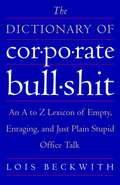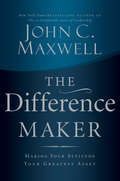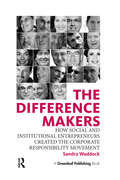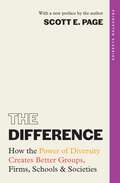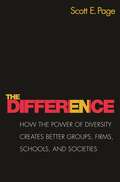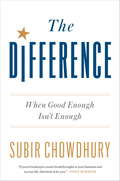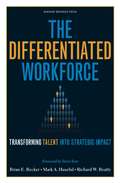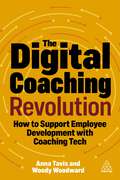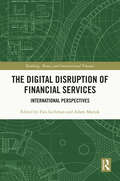- Table View
- List View
The Dictionary of Corporate Bullshit: An A to Z Lexicon of Empty, Enraging, and Just Plain Stupid Office Talk
by Lois BeckwithThis caustically funny Webster's of the workplace cuts to the true meaning of the inane argot spouted in cubicles and conference rooms across the land. At a price even an intern can afford and in a handy paperback format that won't weigh down your messenger bag or briefcase, The Dictionary of Corporate Bullshit is a hilarious guide to the smoke-screen terms and passive-aggressive phrases we traffic in every day. Each entry begins with a straight definition followed by a series of alternative meanings that are, of course, what is really meant.Take, for example, the widely used, seemingly innocuous term brainstorming:1. to generate ideas as a group in an accepting environment and in a free-form manner2. a supposedly relaxed forum in which no idea is a bad idea - that is, until you generate a bad idea and are met with uncomfortable silence/looks that suggest you are retarded or really uncool/the feeling that you are about to be firedBeyond deciphering corporate commonplaces, you'll learn the PC term for secret Santa (Holiday Harry); why the Blackberry is "most commonly referred to as a 'Crackberry' due to its highly addictive nature"; and that when a co-worker says "Have a good night", they really mean: "this meaningless, seemingly interminable exchange of small talk is now over. I am no longer speaking to you, and will now flee this awkward social situation. Don't even think of asking which way I'm walking."Just remember to read this only at COB (close of business) to avoid being busted (caught idling by your boss).From the Trade Paperback edition.
The Dictionary of International Business Terms (Glenlake Business Reference Bks.)
by Jae K. Shim Joel G. Siegel Marc H. LevineThe diversity and complexity associated with the increasing globalization and integration of economies require a familiarity with information technology and terminologies associated with international business. The Dictionary of International Business Terms will be valuable to students and professionals in all areas of business who need to keep abreast of this rapidly changing environment. Over 2,000 terms are defined with examples, charts and illustrations. Additional key areas covered include: global accounting and taxation; exports and imports; global trade, law, and regulations; international organizations; international finance, banking, and investments; economic and business strategies; and management of multinational corporations.
The Die Broke Financial Problem Solver
by Stephen M. Pollan Mark LevineIf you're loosing sleep over your financial worries, help is here at last.Whether you're fretting over a mortgage that's been denied; a loan that's delayed; a marriage settlement that seems unfair; or a business that's struggling, this extraordinary book will not only help you rest easy, it will show you how to turn adversity into success. Here you'll learn the Pollan method for turning no into yes: how to determine your problem; how to make sure you're dealing with only one problem at a time; and how to create an environment of trust. With literally hundreds of scenarios to illustrate it's success, this unique and practical method will make you feel like you've got a coach, strategist, and motivator at your beck and call -- and will help you sleep well, knowing you're on the way to getting what you want.
The Difference Maker: Making Your Attitude Your Greatest Asset
by John C. MaxwellWhat can make the difference in your life today? How can twopeople with the same skills and abilities, in the same situation, end up withtwo totally different outcomes? Leadership expert John C. Maxwell says thedifference maker is attitude. For those who have ever wondered what may beseparating them from achieving the kind of personal and professional successthey've always dreamt of, Dr. Maxwell has some words of insight: "Your attitudecolors every aspect of your life. It is like the mind's paintbrush." In The Difference Maker, Maxwell shatters common myths aboutattitude--what it can do for you and what it can't. Showing you how to overcomethe five biggest attitude obstacles, Dr. Maxwell teaches the skills you need tomake attitude your biggest asset. Most importantly, you'll learn not only howto develop an attitude that will have a tremendous impact on career, family,and daily living, but also how to maintain that attitude for the rest of yourlife.
The Difference Makers: How Social and Institutional Entrepreneurs Created the Corporate Responsibility Movement
by Sandra WaddockIt is not often that we have the opportunity to hear from the early pioneers of a social movement about how it grew and evolved, but that is exactly what this book sets out to do. The Difference Makers tells the stories of 23 entrepreneurs who have been instrumental in developing corporate responsibility; offers an analysis of how CSR has emerged as a key business issue, why it has evolved so quickly, and the visions of its thought leaders.The book examines 23 of the key players who have been instrumental in developing the corporate responsibility movement. They include John Ruggie and the Global Compact, Allen White and the Global Reporting Initiative, John Elkington and SustainAbility, Simon Zadek and AccountAbility, Alice Tepper Marlin and Social Accountability International, Bob Dunn and Business for Social Responsibility, and Joan Bavaria and Ceres – along with many others. The Difference Makers is a history and detailed analysis of how corporate responsibility has emerged as a key political, social, and business issue, why it has evolved so quickly, and what the visions of its thought leaders are for the future. It is essential reading for academics, business people and all those interested in the future of the corporation.
The Difference: How Anyone Can Prosper in Even The Toughest Times
by Jean ChatzkyCan you really start from nothing and become truly secure financially?What's the difference between you and Warren Buffett? Between you and your boss? Or between you and your successful neighbor? What do the financially comfortable have that you don't? It's not that those people were born into money, caught a lucky break, or have an Ivy League education. It's not even that they are smarter than you or make more money than you do each year. So what do they have that you don't . . . at least not yet? What's The Difference?Trusted financial coach Jean Chatzky shares the secrets her groundbreaking research of the self-made wealthy has uncovered so that anyone can break through the barriers that stand between them and true financial freedom. Find out why it's important to:* Get happy, but not too happy* Do what you love, but don't quit your day job* Read every day * Remember that failure is not an option-it's a necessity* Harness your intuition to take risks that make sense * Practice the Kevin Bacon Principle-make connections* Say thank you-and mean it* Make your money work as hard as you doThrough candid interviews and a study of more than five thousand people, Jean reveals the traits and habits of those who have moved from the lowest economic strata to the highest. The Difference helps you take a look at where you are now and offers simple strategies for going where you want to go. The Difference, you'll see, is within you: You have the power to determine your financial future and achieve the next level of wealth.From the Hardcover edition.
The Difference: How the Power of Diversity Creates Better Groups, Firms, Schools, and Societies (Princeton Classics)
by Scott PageIn this landmark book, Scott Page redefines the way we understand ourselves in relation to one another. The Difference is about how we think in groups—and how our collective wisdom exceeds the sum of its parts. Why can teams of people find better solutions than brilliant individuals working alone? And why are the best group decisions and predictions those that draw upon the very qualities that make each of us unique? The answers lie in diversity—not what we look like outside, but what we look like within, our distinct tools and abilities.The Difference reveals that progress and innovation may depend less on lone thinkers with enormous IQs than on diverse people working together and capitalizing on their individuality. Page shows how groups that display a range of perspectives outperform groups of like-minded experts. Diversity yields superior outcomes, and Page proves it using his own cutting-edge research. Moving beyond the politics that cloud standard debates about diversity, he explains why difference beats out homogeneity, whether you're talking about citizens in a democracy or scientists in the laboratory. He examines practical ways to apply diversity's logic to a host of problems, and along the way offers fascinating and surprising examples, from the redesign of the Chicago "El" to the truth about where we store our ketchup.Page changes the way we understand diversity—how to harness its untapped potential, how to understand and avoid its traps, and how we can leverage our differences for the benefit of all.
The Difference: How the Power of Diversity Creates Better Groups, Firms, Schools, and Societies - New Edition
by Scott PageIn this landmark book, Scott Page redefines the way we understand ourselves in relation to one another. The Difference is about how we think in groups--and how our collective wisdom exceeds the sum of its parts. Why can teams of people find better solutions than brilliant individuals working alone? And why are the best group decisions and predictions those that draw upon the very qualities that make each of us unique? The answers lie in diversity--not what we look like outside, but what we look like within, our distinct tools and abilities. The Difference reveals that progress and innovation may depend less on lone thinkers with enormous IQs than on diverse people working together and capitalizing on their individuality. Page shows how groups that display a range of perspectives outperform groups of like-minded experts. Diversity yields superior outcomes, and Page proves it using his own cutting-edge research. Moving beyond the politics that cloud standard debates about diversity, he explains why difference beats out homogeneity, whether you're talking about citizens in a democracy or scientists in the laboratory. He examines practical ways to apply diversity's logic to a host of problems, and along the way offers fascinating and surprising examples, from the redesign of the Chicago "El" to the truth about where we store our ketchup. Page changes the way we understand diversity--how to harness its untapped potential, how to understand and avoid its traps, and how we can leverage our differences for the benefit of all.
The Difference: When Good Enough Isn't Enough
by Subir ChowdhuryIf you saw a toothpick on the floor, what would you do? This seemingly innocuous question was posed to Subir Chowdhury by one of his longtime clients, and ultimately lead him to a profound realization: good enough is not enough. The best processes in the world won't work without developing the kind of mindset — a caring mindset — that is needed to achieve real and sustainable change in both organizations and individuals. In his compelling new book, bestselling author and globally recognized management consultant Subir Chowdhury tackles an issue that has haunted him in his work with many of the world’s largest organizations. Why is it that some improve only incrementally, while others improve 50 times that? The ideas and training are exactly the same. What is the difference? The difference, Chowdhury explains, is the ability to nurture the skills, loyalty and passion of the people who make up an organization. It is a culture built on straightforwardness, thoughtfulness, accountability and resolve. Organizations and individuals that embrace all of these “STAR” attributes—not just one or two of them—will shine. He goes further, showing us why having a caring mindset outside of work is integral to both personal and professional success. A powerful guide to living a successful life and career, The Difference will inspire you to be the difference — at work or home.From the Hardcover edition.
The Differentiated Workforce
by Richard W. Beatty Brian E. Becker Mark A. HuselidDo you think of your company's talent as an investment to be managed like a portfolio? You should, according to authors Becker, Huselid, and Beatty, if you're interested in strategy execution.Many companies fall into the trap of spending too much time and money on low performers, while high performers aren't getting the necessary resources, development opportunities, or rewards. In The Differentiated Workforce, the authors expand on their previous books, The HR Scorecard and The Workforce Scorecard, and recommend that you manage your workforce like a portfolio - with disproportionate investments in the jobs that create the most wealth. You'll learn to:Rise above talent management "best practice" and instead create a differentiated workforce that can't be easily copied by competitorsDifferentiate those capabilities in your company that are truly strategicIdentify your wealth-creating "A" positionsCreate a new relationship between HR and line managers, and articulate the role each plays in a differentiated workforce strategyDevelop the right measures for your organizationBased on two decades of academic research and experience working with hundreds of executives, The Differentiated Workforce gives you the tools to translate your talent into strategic impact.
The Differentiation of Talent: Rethinking Performance Management
by Dick GroteTruthfully evaluating the quality of people's performance-and their potential-allows organizations to make critically important talent management decisions. Unlike conventional performance appraisal, forced ranking is a management process that requires managers to assess how well people performed compared with how well other people performed. It both demands and guarantees differentiation.
The Diffusion of Information and Communication Technologies (Routledge Studies in Technology, Work and Organizations)
by Ewa LechmanIn recent decades, the world has witnessed, unprecedented in terms of speed and geographic coverage, diffusion of new information and communication technologies (ICT). The on-going digital revolution pervasively impacts and reshapes societies and economies and therefore deserves special attention and interest. This book provides extensive evidence on information and communication technologies development patterns and dynamics of this process across developed economies over the period 1980 to the present day. It adopts newly developed methodology to identification of the ‘critical mass’ and isolation of technological takeoff intervals, which are intimately related to the process of technology diffusion. The statistically robust analysis of country-specific data demonstrates the key economic, social and institutional prerequisites of ICT diffusion across examined countries, indicating what factors significantly foster or – reversely – hinder the process.
The Diffusion of Power in Global Governance
by Iver B. Neumann Stefano GuzziniThe study of global governance has often led separate lives within the respective camps of International Political Economy and Foucauldian Studies. Guzzini and Neumann combine these to look at an increasingly global politics with a growing number of agents, recognising the emergence of a global polity.
The Diffusion of Western Economic Ideas in East Asia (Routledge Studies in the Growth Economies of Asia)
by Malcolm WarnerThis book examines the diffusion of economic ideas in East Asia, assessing the impact of external ideas on internal theory and practice. It considers economists from Adam Smith onwards, including Marx, Keynes, Hayek and contemporary economists, and covers the subject both historically and also includes present day and likely future developments. The book covers all the major countries of East Asia, and pays particular attention to specific economists who have had a strong impact in specific countries, and to important developments in economic theory in East Asia, exploring how far these have been driven by Western economic ideas. This book will be welcomed by students and scholars of East Asia and South-east Asia, as well as those interested in economics, economic history and management.
The Digital Business Start-Up Workbook
by Cheryl RickmanHow do I know if my idea will work? How do I decide on the business model? How do I find my audience? Your digital business start-up journey begins here. From the bestselling author of The Small Business Start-up Workbook, Cheryl Rickman brings you a thoroughly practical guide to starting up a digital business, covering the full journey from idea to exit, with easy-to-implement strategies to make your online venture an ongoing success. With a combination of tips, exercises, checklists, anecdotes, case studies and lessons learned by business leaders, this workbook will guide you through each step of digital business. Learn how to: * Assess whether your business idea will work online/digitally * Choose the right business model for your proposition and avoid wasting time * Assess demand, viability and uncover untapped needs and gaps in the market * Build a usable, engaging website and mobile app * Create a buzz using social networking * Drive high quality traffic to your site and convert visitors into paying customers * Use search engine optimization (SEO) and marketing (SEM) tools effectively * Raise finance and protect your business * Build and maintain a strong brand * Recruit and retain a strong team * Sell the business or find a suitable successor. Reviews for the book: "If you want advice on starting your own internet business, don't ask me, read this book instead. It is more up-to-date and costs far less than a good lunch. " Nick Jenkins, Founder of Moonpig. com "This book excels in providing practical guidance on how to create a successful digital business which exceeds customer expectations and keeps customers happy each step of the way. " Scott Weavers-Wright, CEO of Kiddicare. com, and MD of Morrison. com (non-food) "If you read just one book on digital business, make it this one. . . It is inspirational, informative and interactive in equal measure. Highly recommended!" Rowan Gormley, Founder and CEO of NakedWines. com "Interspersed with inspiring and useful stories from successful entrepreneurs, this book can help aspiring business owners through a step-by-step process of refining their start-up ideas and building a solid business. " Elizabeth Varley, Founder and CEO of TechHub
The Digital Coach (Routledge EMCC Masters in Coaching and Mentoring)
by Stella KanatouriThanks to digital media, coaching doesn´t have to be constrained by geographical and temporal boundaries. Using digital media to facilitate coaching processes however, creates a distinct form of coaching practice that requires additional skill from the coach. The Digital Coach contains insights based on a comprehensive, exploratory research that analysed the discussions of a 1,000 member strong online community of coaches and several interviews with coaches to understand their practical experiences of working with technology. At the same time, the book offers information, insights, and examples that can be readily used by the coaching practitioner. Based on the developments in the field, the book provides suggestions about improving the usability of coaching software, and it offers reflections on how emerging technologies like immersive Virtual Reality, Augmented Reality, and Artificial Intelligence might extend coaching practice. Whilst acknowledging the limitations and potential risks that may arise by integrating digital media in coaching, the book suggests that coaching success doesn’t only depend on media capabilities, but also on the coach. The digital coach develops enhanced coaching skills and adapts coaching practice to the media in use. The book is dedicated to the coaching practitioner who uses digital media or who is considering doing so, and is relevant for coaching supervisors, buyers of coaching services, human resource professionals, and software designers.
The Digital Coaching Revolution: How to Support Employee Development with Coaching Tech
by Anna Tavis Woody WoodwardDigital coaching is transforming employee experience and the future of work as we know it. Discover what you need to look for in digital coaching services before signing or renewing a contract with a provider. Digital coaching offers organizations an effective, scalable and personalized approach to employee development that can transform an organization's entire workforce. This technology helps organizations seamlessly schedule, track and manage coaching services as well as evaluate ROI in ways previously unimaginable. The Digital Coaching Revolution is an essential resource for talent management, employee experience, L&D and HR business partners considering or already working with a digital coaching provider, platform or service. Written by Anna Tavis and Woody Woodward, The Digital Coaching Revolution includes information to help you scale digital coaching across your workforce, whether your C-suite is already on board or not. The chapters offer insight into how to determine what will help every company's specific needs, what questions to ask a digital coaching provider before signing or renewing a contract and how to use the data to get more out of this service. With case studies from large organizations that have found success in digital coaching including Visa, CVS and Hilton, this book is the resource you need to upgrade your organization's approaches to employee experience, L&D and broader HR initiatives.
The Digital Creative's Survival Guide: Everything You Need for a Successful Career in Web, App, Multimedia and Broadcast Design
by Paul Wyatt<p>Take control of your digital media career! <p>When it comes to the web and mobile, only one thing is guaranteed, and that's change. If you're a creative working in this ever changing field and looking for answers, look no further. <p>The Digital Creative's Survival Guide gives you the insider's edge you need to stay inspired, informed, and employed. This must-have reference is packed with practical advice on topics like managing studio politics, dealing with nightmare clients, using good digital project management practices, understanding design briefs and finding your niche in a constantly changing industry. Within these pages, you'll discover: <p> <li>Interviews with successful creatives from around the world. <li>Deconstructions of digital design projects that worked. <li>Practical career information and advice for staying marketable and "future-proof." <li>And much more!</li> <p> <p>Showcasing the work and wisdom from some of the best digital creatives in the business today, The Digital Creative's Survival Guide is the tool you need to take control of your career and stay relevant no matter what happens in the industry.</p>
The Digital Crown: Winning at Content on the Web
by Ahava LeibtagThe Digital Crown walks you through the essentials of crafting great content: the fundamentals of branding, messaging, business goal alignment, and creating portable, mobile content that is future-ready. Systems create freedom, and within this book you’ll learn the seven critical rules to align your internal and external content processes, including putting your audience first, involving stakeholders early and often, and creating multidisciplinary content teams.
The Digital Currency Challenge: Shaping Online Payment Systems through US Financial Regulations (Palgrave Pivot)
by P. Carl Mullan<p>Private online digital currency systems offer people accessible, convenient, and inexpensive everyday financial tools outside of traditional bank-owned and operated platforms. Digital currency systems facilitate local and international fund transfers, online and offline payments, and simple cash-to-digital everyday financial products without the need for a conventional bank account of any retail bank product. Over the past several years, Bitcoin has grown into an efficient person-to-person and person-to-business payment system without the backing of any bank or financial institution. This phenomenon is producing a new level of an on- and offline commerce and a society much more attuned to digital currency systems. <p>The Digital Currency Challenge details how new 2007-2008 U.S. legal issues surrounding digital currency products forced companies from the U.S. market and caused the Treasury Department to enact stricter regulations. Mullan profiles new and innovative present day digital currency systems, such as Bitcoin, and illustrates how software designers and monetary theorists use new technology to circumvent current U.S. regulations. This work also explains how new digital currency systems are not just software products, but tools providing financial freedom to people in countries all around the world.</p>
The Digital Disruption of Financial Services: International Perspectives (Banking, Money and International Finance)
by Ewa LechmanThis book contributes to the present state of knowledge, offering the reader broad evidence on how new digital technologies impact financial systems. It focuses on both macro- and micro-perspectives of ICT influence on financial markets. The book demonstrates how ICT can impact trading systems or information systems, which are crucial for financial systems to work effectively. It also shows how individuals can benefit from the adoption of digital technologies for everyday financial (e.g., banking) systems usage. The book provides empirical evidence of how digital technologies revolutionize the banking sector and stock exchange trading system and explores the associations between technology and various aspects of firms’ functioning. Furthermore, it raises elements of financial inclusion, ICT-based microfinance service and finance-related gender issues. The principal audience of the book will be scholars and academic professionals from a wide variety of disciplines, particularly in the fields of finance and economics. It will be especially useful for those who are addressing the issues of new technologies and the financial markets, FinTech, financial innovations, stock markets, and the role of technological progress in a broadly defined socio-economic system. It will be a valuable source of knowledge for graduate and postgraduate students in economic and social development, information and technology, worldwide studies, social policy or comparative economics.
The Digital Dividend of Terrestrial Broadcasting
by Roland BeutlerThe "digital revolution" of the last two decades has pervaded innumerable aspects of our daily lives and changed our planet irreversibly. The shift from analog to digital broadcasting has facilitated a seemingly infinite variety of new applications--audience interactivity being but one example. The greater efficiency and compression of digital media have endowed broadcasters with a "digital dividend" of spare transmission capacity over and above the requirements of terrestrial broadcasting. The question is, who will use it, and how? Comparing the European experience with that of broadcasters elsewhere in the world, the author sketches the current status of international frequency management, quantifies the value of the "dividend" itself, analyzes the details of the analog-to-digital switchovers already completed, and posits what the future holds for the sector. As we grapple with new devices, inconceivable a mere generation ago, that allow us to access digital media instantly, anywhere and at any time of day, this book is a potent reminder that what we have witnessed so far may be just the first wavering steps along a road whose destination we can only guess at.
The Digital Document
by Bruce DuyshartDocuments, such as drawings, memos and specifications, form an essential function in the design and construction industry. Throughout the lifecycle of a built asset, starting from an initial design idea, right through to a final built form and its ongoing management, thousands, even millions of documents can be used to convey various forms of information to a range of interested parties. In many ways, therefore, the success of a design, or construction-based company, relies upon an understanding of the use of documents, as well as the technologies and techniques that are used to create them. The Digital Document provides an extensive background to the issues and technologies surrounding this very important topic. It examines a technical subject in an insightful manner that is neither intimidating nor confusing, even to the novice computer user. By introducing the subject through a series of preliminary reviews of current practices and essential computing technologies, the reader is able to better appreciate the benefits and capabilities of a wide range of digital document types. This book explores the role of documents in a professional practice, examines the components, capabilities, viability, and use of digital documents in the design and construction industry, and identifies and explains many of the standards in use today.In order to facilitate a better understanding of digital document technologies, a number of essential reviews are provided including: - the definition and purpose of a document - how documents are typically used by design professionals - the nature of the digital document environment - the data types which make up digital documentsThe Digital Document is an essential reference for the architect, engineer or design professional that wants to find out more about effective communication in the digital workplace.Bruce Duyshart is an IT Project Manager with Lend Lease Corporation and specialises in the development and implementation of digital media and information management technologies on design and construction projects. He holds a Masters degree in Architecture and is also an academic associate of the Faculty of Architecture, Building and Planning at the University of Melbourne. He has written numerous papers on emerging technologies in the architecture, engineering and construction industry, and has developed Internet web sites for the Royal Australian Institute of Architects and Architecture Media.
The Digital Economy and Competition Law in Asia (Perspectives in Law, Business and Innovation)
by Steven Van UytselThe digital economy, broadly defined as the economy operating on the basis of interconnectivity between people and businesses, has gradually spread over the world. Although a global phenomenon, the digital economy plays out in local economic, political, and regulatory contexts. The problems thus created by the digital economy may be approached differently depending on the context. This edited collection brings together leading scholars based in Asia to detail how their respective jurisdictions respond to the competition law problems evolving out of the deployment of the digital economy. This book is timely, because it will show to what extent new competition law regimes or those with a history of lax enforcement can respond to these new developments in the economy. Academics in law and business strategies with an interest in competition law, both in Asia and more broadly, will find the insights in this edited collection invaluable. Further, this volume will be a key resource for scholars, practitioners and students.
The Digital Economy and the European Labour Market (Routledge Studies in Labour Economics)
by Maria UrbaniecWith a focus on the European labour market, this book seeks to understand how digital transformation affects changes in employee-employer relations. These consequences include shifts in job security and job flexibility as well as alternative work arrangements in the digital economy. This phenomenon has both positive and negative implications for employees and employers. The book presents a theoretical, conceptual and empirical analysis of employment relations in the digital economy, which are manifested, among others, in flexible or non-standard forms of employment, contract work and a radical shift from position-based to skill-based work. The approach taken in the book provides researchers and students of economics, business and other social sciences with an overview of interdisciplinary theoretical and conceptual perspectives and frameworks on labour market and employment relations. In particular, it presents a comprehensive range of research on flexible forms of employment in the digital economy. The range of issues covered is also tailored to business practitioners who wish to understand the ongoing changes in employment relations and the emergence of new forms of work as a result of digital transformation. It will also be of value to representatives of labour market institutions involved in implementing new forms of work and employer-employee relationships in Industry 4.0.
